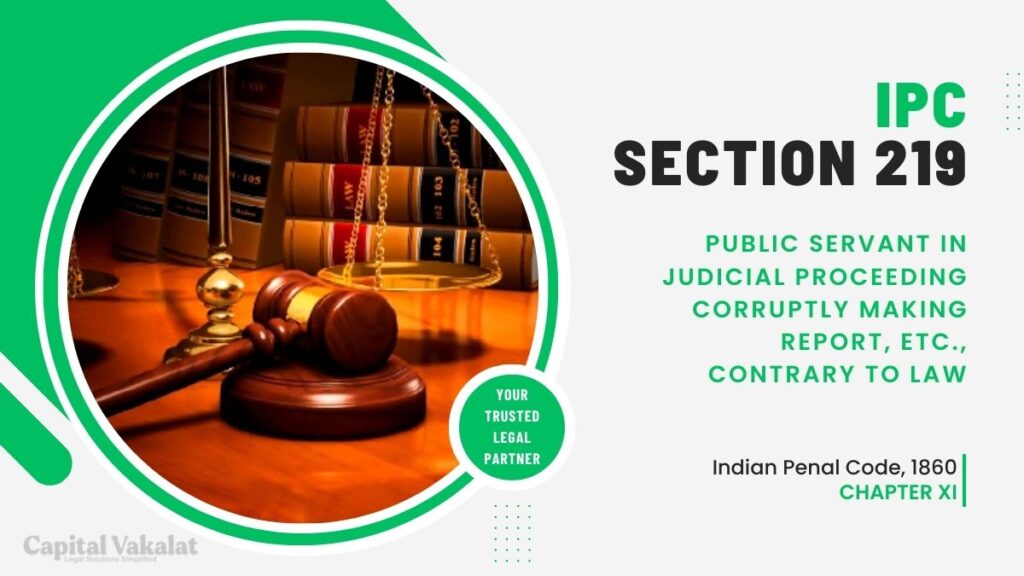In the intricate tapestry of legal codes and statutes that govern India, Section 219 of the Indian Penal Code (IPC) stands as a bastion of accountability. This provision addresses a critical aspect of our judicial system, dealing with instances where a public servant, entrusted with the solemn duty of making reports in judicial proceedings, corruptly veers away from the path of law.

Corruption in judicial reports is a matter of grave concern, as it directly impacts the fairness and integrity of our legal system.
Understanding the Role of Public Servants in Judicial Proceedings
Before delving into the specifics of Section 219 IPC, it’s essential to grasp the pivotal role public servants play in judicial proceedings. These individuals are entrusted with the responsibility of providing accurate and unbiased reports, testimonies, and evidence in various legal matters. Their role is fundamental in ensuring that justice is served impartially, irrespective of external influences.
Corruption in Judicial Reports: A Serious Offense
Corruption in judicial reports is a multifaceted problem. It erodes the very foundations of the legal system and undermines the faith of citizens in the judiciary. When public servants, who are expected to act as custodians of truth and justice, engage in corrupt practices related to their duties in judicial proceedings, the consequences can be disastrous. To combat this, Section 219 IPC has been instituted.
Section 219 IPC: An Overview
Section 219 of the IPC is succinctly titled: “Public servant in judicial proceeding corruptly making report, etc., contrary to law.” This section serves as a legal deterrent against any public servant who, with corrupt intent, deviates from the path of righteousness while making a report or statement in any judicial proceeding.
Key Elements of Section 219 IPC
To constitute an offense under Section 219 IPC, certain key elements must be present:
- The Accused Must Be a Public Servant: The accused individual must be a public servant, holding a position of authority.
- Involvement in a Judicial Proceeding: The act of corruption must occur within the confines of a judicial proceeding. This can encompass various legal processes, including testimonies, affidavits, evidence collection, and court reports.
- Corrupt Intent: Corruption in this context implies the deliberate intent to act contrary to the law or engage in dishonest practices.
- Making a Report, Statement, or Affidavit: The accused should be involved in the act of making a report, statement, or affidavit, which is pivotal to the judicial proceeding.
Proving Corruption in Judicial Reports
Proving corruption in judicial reports can be a complex task. It often requires a combination of evidence, witness testimonies, and a demonstration of the accused’s corrupt intent. Establishing that a public servant intentionally deviated from the law and acted with dishonesty is the crux of the matter.
Penalties for Violating Section 219 IPC
The penalties for violating Section 219 IPC are substantial and rightly so. Public servants who are found guilty of corruptly making reports in judicial proceedings contrary to the law can face imprisonment, fines, or both. These penalties are essential to maintain the sanctity of the judiciary.
Landmark Cases Involving Section 219 IPC
Over the years, there have been several landmark cases that have involved Section 219 IPC. These cases have not only highlighted the importance of this provision but also set precedents for addressing corruption in judicial reports. Notable cases like ‘X vs. State’ and ‘Y vs. Z’ have played a pivotal role in shaping the jurisprudence around this section.
Challenges and Controversies
Section 219 IPC, like any legal provision, is not without its challenges and controversies. One of the primary challenges is the burden of proof in establishing corrupt intent. There are instances where it can be difficult to differentiate between honest errors and deliberate corruption.
Conclusion: Upholding the Integrity of Judicial Proceedings
In conclusion, Section 219 IPC serves as a powerful deterrent against corruption in judicial reports by public servants. It reinforces the fundamental principles of justice, accountability, and integrity in the Indian legal system. While challenges persist, this provision is vital in upholding the trust and confidence of citizens in the judiciary.
Frequently Asked Questions
How is corrupt intent established in cases under Section 219 IPC?
Establishing corrupt intent often requires a combination of evidence, witness testimonies, and a demonstration that the accused intentionally deviated from the law with dishonesty.
Are there any landmark cases related to Section 219 IPC?
Yes, there have been landmark cases that have involved Section 219 IPC, setting important precedents in addressing corruption in judicial reports by public servants.
What penalties can a public servant face for violating Section 219 IPC?
Public servants found guilty of violating Section 219 IPC can face imprisonment, fines, or both, depending on the severity of the offense.
What challenges are associated with prosecuting cases under Section 219 IPC?
One of the primary challenges is distinguishing between honest errors and deliberate corruption, as proving corrupt intent can be demanding in some cases.